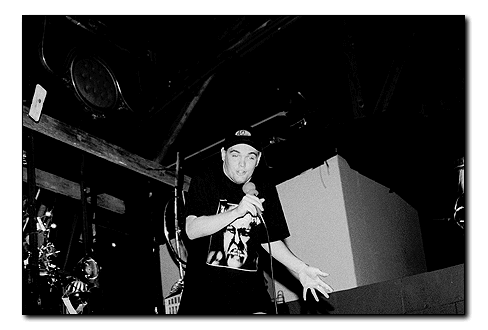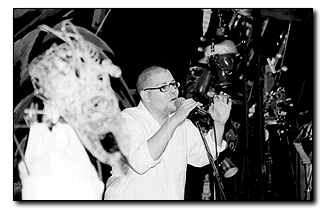![]()
![[ ARTS
]](/images/fall97/artsublogo.gif)
![]()
By Tom Collins
Arizona Daily Wildcat September 18, 1997
The People's Republic of Poetry
![[Picture]](25_2_i.gif)
Katherine K. Gardiner Over a hundred people gather to listen to poets from near and far share their talents and take in the artwork at last Friday night's Poetry Slam held at the Mat Bevel Institute. |
Airrehn Bradley's going to make it to Broadway. You know, New York City.
All on account of poetry. See, every little bit helps.
This is the story of last week's poetry slam at the Mat Bevel Institute.
The performance poetry contest, put on by Jill and Bob Ruttenberg and others, ran in conjunction with the Awareness Journal Expo that was in town. Over 100 people showed up.
To hear poetry.
Thirty-nine people showed up just to play the slam.
Now, before we go any further let me explain the slam.
The ultimate poetry contest, slams started years ago at a bar in Chicago called the Green Mill. Legend has it the whole deal was started by a guy named Marc Smith. Anyhow, Marc and his friends decided to start performing poetry in a bar. And the rest is history. There are now regular slams across the country. Supposedly there's going to be a world slam in a couple of years featuring 22 countries. There has been a national slam for years. This year's was in Middletown, Conn.
The contest works like this. You sign up. Five judges are selected from the audience to score your performance on a 10-point scale. The top and bottom are thrown out, Olympic style and the remaining 30 points are kept. There are usually three or four rounds, but last Friday, there were only two, for obvious reasons.
It's a great way to kill an evening. And if you tell the world there's $400 in prize money, well, $3 admission is a cheap bet.
The host for the evening, Jim Nave, said he'd never seen more slammers for one night's festivities. He's from Asheville, N.C., the town that held the 1994 nationals. And indeed there were.
Now, let me fill you in on another detail. The thing started in a bar, right, so performance is part and parcel. The judges are issued a sort of rule of thumb, which they often ignore, to use half the points for the performance and half for the presentation.
There were a lot of people who never slammed before in their lives at this thing. Lots of people huddled over the microphone with a notebook mumbling Hallmark card crap.

Katherine K. Gardiner Arizona State music junior, Josh Ostrander slams at last week's Poetry Slam. Ostrander took first place with a prize of $250. |
And that is what poetry is, by and large, when you get away from the university. It's like my friend Carl said, "30 percent of Americans write poetry and 10 percent read it."
And so you can imagine a 39 person poetry deal could drag, but all credit to Nave, he kept the energy up as well as anyone I've ever seen.
He didn't fool around, just pushed the thing along.
That having been said, performance.
Performance is important.
How else are you going to get someone to listen to you in a big, weird, hot room?
Without performance a recognized writer like Alison Moore slips into the obscurity of the group. Maybe the poem was better, but then again maybe it isn't.
Because poetry was always meant to be spoken and speaking makes the poem.
This brings us squarely to the next character in this little story, Josh Ostrander.
He gets up on stage and just moves, like there's really fast music in his head that he's singing along to and he talks reallyreallyfastbutyoucan actuallyunderstandeverythinghe's sayingbecauseheennunciatesreallywell.
Got big lungs.
So Josh moved to Phoenix and now he dominates the slams up there. The rivalry Airrehn and he had, well, it's one for the ages, if you're in to that sort of thing.
A much as Josh moves around the stage, Airrehn doesn't. He stands still in front of the microphone, just his arms waving. Waving and whirling like a dervish. He's been pissed off lately, and his work reflects it. His performance is all deep gasps of rage, like he's drowning in the incomprehensibility of it all.
Airrehn and I met at the Mary McCann Poetry Slam at the Orbit Cafe in Phoenix in 1995.
I was a just out of my freshman year in college, working at 7-Eleven, living with my parents and wondering what the hell I was going to do with my life.
All that good 18-year-old stuff.
Maybe I don't want to go to college. Maybe I should get a Vespa and motor around the country looking for stuff to write about. Real beat shit.
Anyhow, Airrehn, who's a month younger than me, was in the same boat.
We spent that summer performing at the Orbit and before long, we were winning more often than not. Or rather, Airrehn was winning and I was finishing second.
Then we'd go to Denny's.
To make a long story short, I went back to Tucson.
Airrehn went back to school but it didn't take. Then his girlfriend got pregnant. Then he was married with a son and now he's just gone.
And that night Airrehn was outside smoking and inside pacing then back and forth again.
Sitting there waiting through countless poets for your time to shine is tough.
Just ask Jason Ott.
He's a Tom-Cruise-looking MFA grad from the UA who currently works in marketing.
When he gets up stage, it's with a notebook, but somehow with his delivery it works. He plays the idiot savant poet, drawing on the mundane and calling it the important and at the same time deflating the importance and thus making the piece important.
Got it?

Katherine K. Gardiner Poet Airrehn Bradley ad-libs in the second and final round of the Poetry Slam. Bradley took home second place and $100. |
"I'm gonna puke if I don't go," Ott said.
Yes, indeed.
And when you go, well that's important, too.
Nobody wants to go first and, in a group this big, nobody wants to go last.
Airrehn Bradley gets up and does a piece called "What I've seen" with lines like "I've never seen a poem that can take a tank tread off a Chinese student," and "It's time to turn our pens into plowshares and our plowshares into swords," and it's a call to revolution.
Later in the evening as the crowd begins to give up the ghost and go home, he gets the blood pumping. You can feel the silence afterward and the contempt and at the same time love for everyone. It is the power of words and voice.
When Airrehn Bradley says he wants to tear up his son like paper and inject him into his veins while he's tearing at his arm it means something. Something that transcends.
When Josh Ostrander tells the tale of his friend who was a dork and regularly beaten because of it and how one day he "cursed it all" because he hates and hates and hates and is hated, for no good reason at all. When it's that essential, that stripped down, that dramatic. When Josh is on his hands and knees playing his friend, what kind of world is this?
This is why I go to poetry slams.
To see people bleed.
I finished fourth.
Got beat by Tim Patterson, a tall, British guy who reads funny little pieces out of his notebook. I think one of them was about ham sandwiches on the British rails.
I don't like to lose.
Airrehn got second and he needed it.
Needed the money or the recognition for the bloodshed, for the tears.
Needed this to say it's OK, it's all right. Sleep tight.
Jim Nave says the national slam scene is like a tribe and truth be told, if you know one slammer you probably know a lot. There's a vibrant Internet community, for example.
And in this world community is all right.
There's a million lost souls out there, looking for a sign.



